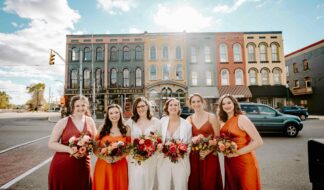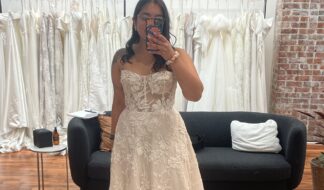By Amy Lynn Smith
Originally published in Pride Source Magazine June 2016
There's no question that the landscape of LGBTQ equality has shifted dramatically since the 2015 U.S. Supreme Court decision legalizing same-sex marriage. It's the equivalent of a massive earthquake that's done more good than harm.
But the aftershocks are significant. Those who oppose LGBTQ equality are pushing back and the backlash is fierce, both in Michigan and across the country. Still, when you talk to leaders in Michigan's LGBTQ movement, the prevailing attitude is one of optimism. That's not to say there isn't a healthy dose of realism about the sometimes daunting amount of work that's left to be done. Some of this work has been ongoing for decades, and some of it is new work that's directly related to bold attacks in the wake of marriage equality. Regardless, those leading the charge toward equality are hopeful and determined. The key, they agree, is to work together and never lose sight of the ultimate goal of lived equality for the entire LGBTQ community.
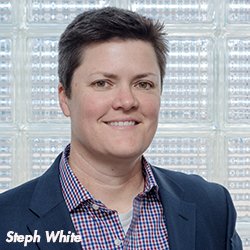
"My prediction is that we'll look back on 2016 as a year in which things changed and shifted for the LGBTQ movement in Michigan," says Steph White, executive director of Equality Michigan. "It's going to take a combination of diverse, powerful leadership that's also coordinated and unified in its efforts. I think 2016 is the year when we know that and have those components in place."

White goes on to say that the LGBTQ movement needs to demonstrate and exercise its political clout in a smart, strategic way. "We've kind of been on the sidelines in terms of politics in our state," she explains. "If we're going to stop being used as a political football by both sides, we have to come to the game with our own political clout. That means people voting and being engaged in the political process."
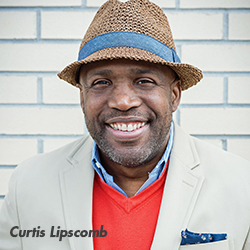
Curtis Lipscomb, executive director of LGBT Detroit, feels strongly that the movement has already come together. But that's only the beginning. "We've worked together for years to amend the Elliott-Larsen Civil Rights Act (ELCRA) and on many other initiatives," he says. "The real question is: What further actions could we engage in and what partners can we raise up so the work can be done more easily?"
The Tireless Pursuit of Civil Rights Protections
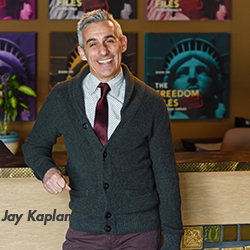
The single biggest issue — although not the only one on leaders' minds — is expanding ELCRA to include protections for the LGBTQ community. Jay Kaplan, staff attorney for the ACLU of Michigan's LGBT Project, says expanding ELCRA would resolve many issues currently facing the community, but there's a lot more education and groundwork that must go into achieving the goal.
"I get that people are impatient," he says. "But if this issue was so easy to resolve you'd see more states actually having civil rights protections for our community."
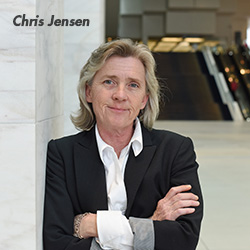
Although Chris Jensen, district director and campaign manager for Congresswoman Brenda Lawrence, is among those who didn't oppose the idea of a ballot initiative to amend ELCRA, she's not sure that avenue is feasible right now. She says a key first step to expanding ELCRA is winning back the state House and electing more progressive candidates. "I still don't know that there would be enough political pressure to get things through the Michigan Senate," she says, "but there's never going to be a perfect time in politics. You just have to move forward."
Many others share Jensen's focus on electing more Democrats in 2016 and beyond, but there's also an increased emphasis on bipartisanship. After all, with Republicans in the majority and expected to continue holding a significant number of seats in the near future, it's crucial to gain the support of those who are on the side of LGBTQ equality or could be educated enough to become allies.
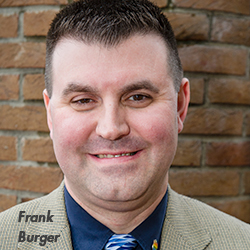
"I'm a staunch Democrat, but we have to learn to work across the aisle," says Frank Burger, chair of the Genesee County Democratic Party, who serves in many other capacities including on the Michigan Education Association (MEA) Board of Directors. "We have to show Republicans — and there are some good ones — that we live and work in our communities and pay taxes, just like everybody else."
Signs of Progress
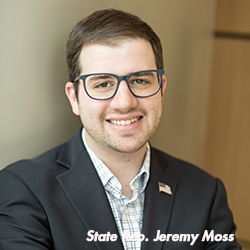
Even with a heavily conservative Michigan Legislature, there have already been some victories. An attempt to knock out local anti-discrimination ordinances as part of House Bill 4052 (now Public Act 105) in 2015 was defeated. According to State Rep. Jeremy Moss, the tide is slowly shifting in the direction of equality. In fact, he believes if expanding ELCRA were put to a vote before the end of the 2015 legislative session, it would pass. "The current Speaker (Rep. Kevin Cotter) won't bring it up for a vote," Moss says, "but I'm hopeful a new Speaker will in the next session. There are legislative Republicans in the House who would vote for expansion today."
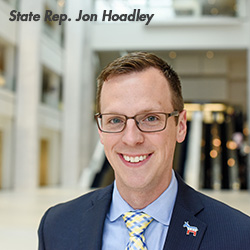
The presence of openly gay legislators like Rep. Moss and Rep. Jon Hoadley is making a difference, and they both hope other members of the LGBTQ community will join them in the House and Senate. If nothing else, it's harder for lawmakers to push blatantly anti-LGBTQ legislation when someone from that community is sitting across from them in the Legislature. "There's a notable difference in having LGBTQ people in policy-making discussions," says Rep. Hoadley. "When folks step out of line (and push anti-LGBT agendas), there are consequences. It damages relationships. People at meetings can hold them accountable. We've seen it already."
Pushing Back Against Discrimination
Rep. Hoadley, although generally optimistic, has concerns that attempts to roll back LGBTQ protections in Michigan — similar to the legislation passed in North Carolina in 2016 — are inevitable. That's why he shares the view of so many that the LGBTQ community has to move forward from marriage equality without taking a breath. After all, discriminatory legislation is largely a response to the progress won in the marriage equality decision.
Anti-LGBTQ legislation would be particularly harmful to the transgender community. Across the country, transgender people face higher rates of discrimination and even violence, and are becoming a focal point of the anti-marriage equality backlash. Amy Hunter, project coordinator for the ACLU of Michigan's Transgender Advocacy Project, agrees that amending ELCRA is the primary objective, even as there are incremental steps to take along the way to reduce the fearmongering and scapegoating seen with "bathroom bills" and other anti-LGBTQ legislation. "The critical step here is not just education but familiarity," Hunter says. "We can spout facts all we want, but what we need to do is empower transgender people to advocate not only for themselves but for their community, and have that engagement at a broader level than any one person can do alone."
Along with expanding ELCRA protections, fighting so-called Religious Freedom Restoration Act (RFRA) bills is another focus for the LGBTQ equality movement. Proponents of RFRA-type bills claim they are simply an extension of the Constitution and seek to protect religious expression. But the truth is that these laws — like the one in Michigan allowing state-funded faith-based adoption agencies to turn away prospective parents and youth on the basis of religious objections — are nothing but anti-LGBTQ legislation in disguise. "When the adoption legislation passed, one of my Republican colleagues apologized to me for voting for it," says Rep. Moss. "That doesn't excuse her voting for it, but if I hadn't been there, there would have been no one for her to apologize to."
Taking Action at the Ballot Box and Beyond
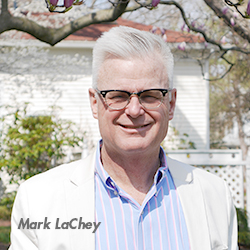
Ongoing challenges like these highlight one of the many reasons why Democrats are working diligently to elect more pro-LGBTQ Democrats in 2016 and beyond. "Our number-one goal in 2016 is taking back the state House," says Mark LaChey, chair of the LGBT and Allies Caucus of the Michigan Democratic Party (MDP), who also serves on the MDP Executive Committee. "We need to flip nine House seats, so it's an achievable goal."
It's also vitally important to elect pro-LGBTQ candidates up and down the ticket, both at the state and national level, in 2016 and beyond. Voting is essential, but it's not enough. "Voting is the lowest bar," LaChey says, "second only to posting on Facebook."
Everyone agrees that getting involved in the election process is critical, including being educated about who the candidates are with resources like the Pride Source Voter Guide. What's more, candidates need to know that LGBTQ people support them. When you make a donation, LaChey says, note that you are part of the LGBTQ community or an ally in the memo field of the check. And help candidates in districts other than your own if they face a tough challenge from a Republican.
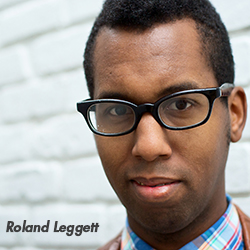
Roland Leggett, principal at Roland Leggett Strategies, has long believed in the power of organizing, even as he admits it's not "sexy." But it's essential to a winning strategy.
"Knocking on doors and making phone calls is what it takes," he says. "There's no fundraising letter or flyer that will change a voter's mind the way a conversation with them will. That's how we make sure the folks who are with us are in office and those who aren't supportive of us are invited to leave. And then we have to hold our elected officials accountable."
White underscores the importance of voter involvement. "The constituencies that get the most attention from lawmakers are the ones who make their voices heard," she says. "The more involved we are — in voting, volunteering, donating — it increases our chances to be in conversation with them. The more we have relationships with them, the more they'll hear us and enact policies on our behalf."
This is particularly important at a time when many voters feel overwhelmed by the negativity in politics. "Political discourse has hit a level of ridiculousness that drives some good voters underground," Jensen says.
But now is not the time for supporters of LGBTQ equality to back down, Kaplan says. Although many are exhausted after the long fight to win marriage equality, the community must stay actively involved, a challenge he acknowledges. "How do we keep people engaged and let them know there's more work to do — not only the LGBTQ community but our allies?" he says. "Marriage equality isn't the whole enchilada, so we have to get people to see the value in staying involved in other issues that impact our community."
From Leggett's perspective, people want to feel like they're part of something that's moving forward. Fortunately, the LGBTQ community is doing just that, even if progress seems incremental.
For example, LGBT Detroit is actively pursuing strategies to engage the community, often by bringing together its many intersecting parts. "You need many of us to do that work and we encourage people to get involved," Lipscomb says. "Not one of us can do it all."
Onward Toward Lived Equality
Rep. Hoadley urges everyone to be heard on the issues, during elections and beyond. "We've seen so much progress, but it's in jeopardy if we don't engage in the political process and rebuild some political power," he says.
And like the rest of the LGBTQ community, he's not talking strictly about equality. In fact, demonstrating all the issues the LGBTQ community has in common with everyone in Michigan — such as quality public education, clean drinking water and decent roads to drive on — can go a long way toward building relationships. Addressing all the intersecting issues the community cares about is also fundamental to the goal of lived equality.
"We try very hard to show that our issues are everyone's issues," LaChey says. Economic issues are central, especially as Michigan's economic recovery continues to be slower than anyone would like it to be. "More young people identify as LGBT and they're leaving the state for elsewhere," Rep. Moss says. "If we don't keep a vibrant LGBT community here, that impacts the economic and quality of life issues we tackle."
To address the broad array of issues that touch LGBTQ people, the community must continue working with organizations such as labor unions, reproductive rights advocates and other groups that promote social justice, Burger says. The LGBTQ community is not alone, and expanding on that unity is how the coalition continues to pursue the goal of lived equality.
"Access to healthcare, a non-discrimination act that covers employment, housing and access to public accommodation — these are long-term goals," Hunter says. "We need to break down systemic and institutional barriers and further long-term cultural changes that allow the transgender community to have truly lived equality." And it's not just the transgender community, but the entire LGBTQ movement, that seeks lived equality.
"We're talking about changing society's attitudes and approach toward LGBT people, to fully embrace all Michiganders, and that's hard work," White says. "It's not just a matter of changing the laws. It's changing the tone and tenor of our state and how we relate to each other. We're talking about changing the personality of Michigan, and that takes this kind of distributed, decentralized leadership that we're seeing emerge."
"I'm hopeful, and I'll tell you why," Lipscomb says. "Our programming attendees are millennials, who are often engaged with devices but are choosing to engage now face-to-face. Diverse people walk into our office: straight, queer, some have severe socioeconomic issues, some are well-to-do. If I didn't see those people, I'd feel differently about the future. But they feel we're a resource. Because of their shiny bright faces and their criticisms, we're getting marching orders and new participation in our work. It's exhausting, but I'm hopeful."
Stay Engaged
ACLU of Michigan Transgender Advocacy Project
Amy Hunter, Program Coordinator
[email protected]
http://www.aclumich.org
313-578-6800
Equality Michigan
Stephanie White, Executive Director
[email protected]
http://www.equalitymi.org
313-537-7000
LGBT Detroit
Curtis Lipscomb, Executive Director
[email protected]
http://www.lgbtdetroit.org
313-285-9733
LGBT and Allies Caucus of the Michigan Democratic Party
http://www.facebook.com/TheLGBTACaucusoftheMDP
State Rep. Jon Hoadley
N994 House Office Building
P.O. Box 30014
Lansing, MI 48909-7514
Phone: 517-373-1785
Toll-Free: 888-833-6636
Email: [email protected]
http://housedems.com/state-rep-jon-hoadley
State Rep. Jeremy Moss
N-799 House Office Building
P.O. Box 30014
Lansing, MI 48909-7514
Phone: 517-373-1788
Toll-Free: 844-347-8035
Email: [email protected]
http://housedems.com/state-rep-jeremy-moss



